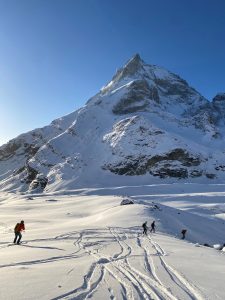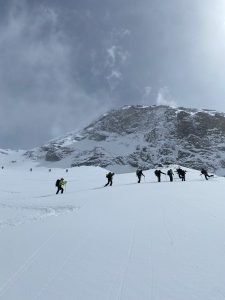Exercise SKIMO WARRIOR in April this year was the final exercise to prepare the UK Armed Forces Team to compete in the Patrouille des Glaciers (PdG). The PdG is the most prestigious ski mountaineering (skimo) race, with 4,386m of ascent over 58km from Zermatt to Verbier. Teams compete in patrols of three, racing through the night to reach Verbier by midday the following day. The race has its origin in Swiss military patrols from the Second World War guarding their mountain borders.
The UK Armed Forces Team completed a training exercise in Bavaria in February to introduce new members to skimo and build the team’s endurance. Patrols were then selected for the PdG and during Ex SKIMO WARRIOR we focused on skiing parts of the PdG course in preparation, acclimatising and safety training. There are two courses in the PdG, the full and half. Those who had recently started skimo were able to represent the UK Armed Forces Team in the half course.
We were based in Arolla for the first half of the exercise, a village at the halfway point of the PdG. This offered fantastic access to off piste terrain, including several glaciers which form part of the PdG course. We practiced glacial travel as a rope team, skiing when roped up and crevasse rescue drills. Skiing tied together requires careful control and led to a lot of bemusement from recreational skiers on the piste.
For the next part of the exercise, we moved to Zermatt to familiarise ourselves with the start of the race and acclimatise above 2,000m. Ski mountaineering skis are thin and extremely light-weight and they drew some interesting stares from those on regular ski holidays – who were confused by why we were choosing to ski uphill. The time we spent training meant we were in good shape to compete. However, high temperatures, a large snowfall and ferocious winds increased the risks on the course.
The Swiss Military run the PdG as their national confirmatory exercise every two years. They hosted all the military teams for the final few days before the race. Here we went through kit checks and decided our race strategy. However, the race organisers had disappointment in store for us when they decided to cancel the main race due to the avalanche risks. This meant that only some of the Armed Forces teams were able to compete in the half course event.
While it was unfortunate, the exercise was undoubtedly an excellent foundation in ski mountaineering racing for us all, building our skills on glaciers and awareness of the risks. One member commented that the design of the exercise meant that we were both physically and mentally prepared for the challenges of the PdG. Not being able to race the full course has increased the determination of many to come back in 2026 for the next iteration.








